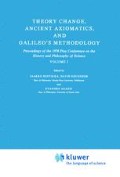Abstract
In books and papers written about Galileo in the last few decades — from Alexandre Koyré to today’s historians of science — the general idea becomes clearer if we compare these works to those written prior to this period, in the first quarter of the 20th century. As an example, let us analyse Leonardo Olschki’s opinion of Galileo or, to be more exact, the impression he conveys by means of a certain accent rather than in the form of an explicit idea. Olschki places primary emphasis on Galileo’s relation to modern thought, to Newton’s Principia, and in general to the classical science which can be described by means of a stable paradigm. As a result, the ties between Galileo and the Renaissance appear somewhere in the background. The starting point from which Galileo’s role in the history of science is to be evaluated is to be seen in the topmost achievements of the classical science. Historians who worked in the early 20th century proceeded from the idea that Galileo already knew the idea of inertia, though not rectilinear inertia, but had no concept of a gravitational field. Their Galileo is a predecessor of the classical science or, probably, its founder. But there is another aspects to be accounted for, the restrospective relation to the 16th century, to the period at which science cannot be generally characterized by reference to a paradigm and at which its full-fledged evaluation involves contradictory, even mutually exclusive, paradigm which are never the less inseperable from each other.
Access this chapter
Tax calculation will be finalised at checkout
Purchases are for personal use only
Preview
Unable to display preview. Download preview PDF.
Notes
A. Einstein, Collected Scientific Works, vol. IV, Moscow, 1967, pp. 266–267 (Cited from the Russian edition).
Editor information
Editors and Affiliations
Rights and permissions
Copyright information
© 1980 D. Reidel Publishing Company
About this chapter
Cite this chapter
Kuznetsov, B. (1980). Galileo and the Post-Renaissance. In: Hintikka, J., Gruender, D., Agazzi, E. (eds) Theory Change, Ancient Axiomatics, and Galileo’s Methodology. Synthese Library, vol 145. Springer, Dordrecht. https://doi.org/10.1007/978-94-009-9045-6_17
Download citation
DOI: https://doi.org/10.1007/978-94-009-9045-6_17
Publisher Name: Springer, Dordrecht
Print ISBN: 978-94-009-9047-0
Online ISBN: 978-94-009-9045-6
eBook Packages: Springer Book Archive

